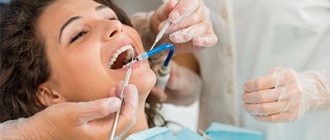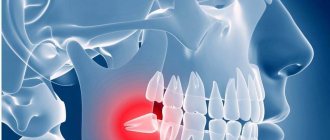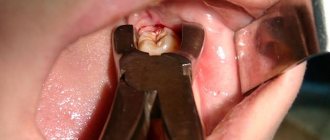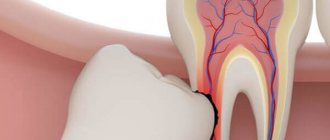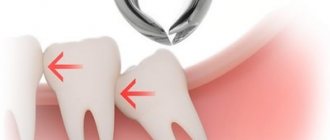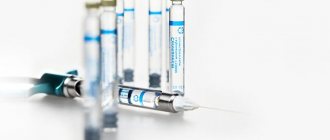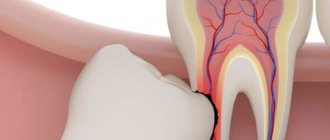Should wisdom teeth be preserved?
We think yes.
Although wisdom teeth are not involved in the process of chewing food, they can still benefit a person. There must be clear medical indications for their removal. And now we will provide you with another proof of the benefits of your own teeth-eights. Our patient Kim is about 20 years old, she is from Korea and lives in Moscow, as her parents work at the Korean embassy. I contacted the German Implantology Center due to inflammation of tooth 4.6 – the lower right six. The tooth was destroyed
, an abscess developed. There was a temporary filling on the tooth (placed in another clinic):
Where a temporary filling was placed, she was told to remove the tooth. That's why Kim came to us with one simple goal - to atraumatically remove the six, which began to greatly bother and hurt her. After doing a CT scan and looking at the tooth, we offered her an option, which, upon hearing, Kim at first did not believe her ears. Our proposal was to remove the six and immediately in its place... transplant its lower right wisdom tooth! This is called autotransplantation surgery.
Wisdom tooth transplant as a way to replace a defect
Of course, Kim was very surprised, but we showed her photographs of successful operations (and we have all of them successful), apparently our persuasiveness and the patient’s desire played a positive role in making the decision to transplant the eighth tooth. She was happy and agreed to the operation.
Moreover, in this case we did not even have to make a stereolithographic model of the tooth, since all surgical procedures (extraction and transplantation) were performed on the very first day of her visit to our clinic.
Dental transplant surgeries typically require several days of preparation, as we describe in the following clinical case study. But in this case, taking into account the current clinical situation and relying on our many years of successful experience in tooth transplantation, we were able to transplant tooth 8 into the place of tooth 6 as quickly as possible. We had all the indications for current dental transplantation.
The donor was an impacted (completely hidden under the gum) wisdom tooth 48. In fact, as we joked, it was a neighbor tooth to the problematic six. That is, the tooth grew and grew for 20 years, waited in the wings, and that hour struck! Now this donor tooth is for another 30 years
at least he will live in a new place.
If you look at the sixth tooth from the side, you can see bluish, literally purple gums
:
This color of the gums is due to the developed inflammatory process. The patient developed destruction of bone tissue against the background of advanced periodontitis. There was a crack in the root of the sixth tooth.
What are the dangers of premature removal of baby teeth?
Speech disturbances, inhibited bone growth and unnecessary pain are just some of the unpleasant consequences of not properly caring for baby teeth. Some parents mistakenly believe that there is no need to worry about baby teeth if they fall out anyway. Premature loss of primary teeth, that is, 3-4 years before the date of their physiological loss, in adulthood leads to unpleasant consequences - crowding or various types of malocclusion.
Baby teeth have a specific structure and are very susceptible to caries. Their premature loss is most often caused by advanced caries or mechanical injuries. If primary teeth begin to deteriorate, inflammation of the pulp quickly occurs, and then inflammation easily occurs with complications around the periapical tissues or abscesses. In such cases, it is often impossible to perform root canal treatment. All that remains is to remove the baby tooth. The whole process of pain and treatment exposes the baby to many troubles, and it is worth protecting him from this.
The difference between transplanting your own tooth and implantation with a dental implant
By the way, for your transplanted tooth, the presence of an inflammatory process in the soft and bone tissues does not matter, because all the tissues there are their own and, naturally, the body will protect its transplanted tissues. That is, the body does not treat the transplanted tooth as “friend or foe,” which always happens in the case of tooth implantation with a titanium or zirconium implant.
If there is an inflammatory process, an artificial implant cannot be placed in this place. And you can put your own tooth, because it has the so-called. the ligament of the tooth that has all the cells that will fight.
Naturally, after the tooth extraction, we processed everything as much as possible, carefully cleaned and rinsed it.
In this photo we have begun to treat the wound. It can be seen that there was an inflammatory process in the gums, the bone tissue was partially but severely destroyed. Signs of bone tissue destruction are clearly visible on computed tomography:
By the way, even if the bone tissue is destroyed, when we transplant our own teeth, we do not need bone grafting; there is no need to replant additional bone. And that's why. The tooth itself nourishes and regenerates. Even if there were no front wall of the tooth, if there were no vestibular buccal wall, if you transplant such a tooth, then it is restored from its ligament, even the bone grows.
Therefore, if there is a choice between transplanting your own tooth and implanting a dental (titanium, zirconium) implant, it is better to opt for transplanting your own tooth.
Let's begin atraumatic wisdom tooth removal
In 40 seconds
We made an incision in the area of the donor tooth, which we planned to remove and replant in place of the previously removed six. We carefully removed the wisdom tooth, placing it in a saline solution for a short time:
Many people wonder: do wisdom teeth have roots? Yes, of course there is – this is a molar. We draw your special attention to the fact that this wisdom tooth 48 has not yet finished growing its own roots, its maturation is not yet complete. The growth zone of the root of the lower wisdom tooth is preserved and this tooth subsequently, after 2 weeks, does not require nerve removal! That is, it not only grows in, but also completely becomes accustomed to its nerve.
a powerful ligamentous apparatus he has.
, which provides high survival potential. Indeed, this tooth has taken root, and besides, it has a living nerve.
Transplantation of a wisdom tooth into place 4.6
The donor tooth was clearly placed in the place of the problematic sixth tooth. It was as if he had been there all his life: ideal external dimensions, the wisdom tooth was transplanted to the place of the removed one without any external grinding. Ideal autotransplantation operation.
The implanted tooth is tightly sutured
to ensure maximum tissue contact with each other and a normal healing process.
Why do baby teeth deteriorate?
Damage to a baby tooth most often occurs due to caries in early childhood. This disease can take different forms. The wrong way to feed a baby can lead to bottle tooth decay. If the baby falls asleep with a bottle in his mouth or is given formula or sweet tea after waking up at night, then streptococcal bacteria develop in the mouth during sleep. They are the ones who contribute to the occurrence of this variant of the disease.
In older children, two and three years of age, circular caries is observed. This is the name of the early stage of caries with an acute course. It first begins to attack the front teeth, most often in the upper jaw and symmetrically on both sides, and then leads to pulp complications. A tooth with a damaged crown is not suitable for root canal treatment and must be removed. Leaving a baby tooth damaged by caries is dangerous because it is an inflammatory source in the child’s mouth.
Another very common cause of loss of baby teeth is childhood trauma. It is not uncommon for a child to lose teeth due to a fall. One of the main reasons is that the design of primary incisors is completely different from permanent incisors. They are smaller, have shorter roots, and the jaw bones are more spongy. Children of certain ages are at greater risk of injury:
- the first and second years of life are when they are just learning to walk, but the older the child, the greater the risk;
- later, at the age of four to six, other activities appear: playing with a ball, running, climbing.
So it is not difficult to lose a tooth. Often, the premature loss of baby teeth in children is not given much attention. However, the roots of an extracted baby tooth are usually not completely resorbed, and the root of a permanent tooth is still in the early stages of development. This has quite serious consequences, so the indications and contraindications for removal should not be ignored.
After autotransplantation 2 weeks
Patient Kim came to us after 2 weeks
for medical examination and suture removal:
Nothing bothered her anymore. The tooth had acceptable physiological mobility. The gums have become lighter. Of course, all the purple color is not gone yet, but she has already become more pink.
Pay attention to the white area - this is not pus, but fibrin plaque, which we will talk about in more detail below.
The picture shows that the donor tooth has clearly positioned itself in the position of the extracted tooth 46:
Our Kim has a new six molar. Both the patient and the medical staff of the Research Center are very pleased with the outcome of the tooth transplantation operation.
Indications, contraindications and conditions for transplantation
Tooth reimplantation is possible if there is a donor who matches the root system of the missing unit. Simply put, it is impossible to transplant a tooth that has 4 roots in place of a two-rooted one. Another condition is that the donor must be healthy.
The main indication for transplantation is young age (up to 18 years), when implantation has not yet been performed.
The list of contraindications is extensive:
- diabetes;
- general diseases – nervous, cardiac, endocrine;
- oncological diseases;
- mental disorders;
- intolerance to anesthesia;
- slow bone tissue regeneration.
The main problem: the availability of a donor. Wisdom tooth transplant is the most common method.
About fibrin and fibrin plaque
Fibrin
- a high-molecular, non-globular protein formed from fibrinogen, synthesized in the liver, in the blood plasma under the action of the enzyme thrombin; has the form of smooth or cross-striated fibers, the clots of which form the basis of a blood clot during blood clotting. Thus, fibrin promotes rapid wound healing by forming fibrin plaque.
Fibrin plaque
- a natural phenomenon that occurs in the oral cavity in the area of surgical intervention (at the site where a tooth was removed, stitches were applied, etc.). It occurs on the 3-4th day after surgery in the oral cavity. And this is one of the normal and inevitable stages of healing of a hole covered with a blood clot. This is followed by tissue restructuring, covering the wound with protective epithelium and restoration of normal mucosa.
Patients often confuse fibrin plaque with pus, causing them to worry and call their dentists.
Why does fibrin plaque occur?
Healing of a wound in the oral cavity occurs in a moist environment. If you have a cut on your skin, once the bleeding stops, the wound will be covered with a scab. We all know from childhood that this crust cannot be torn off. A blood clot covered with fibrin plaque is essentially the same “crust”, only in the mouth. And you can't touch her either! Otherwise, the healing process will take longer and the result will be less favorable.
There is no need to rinse out fibrin plaque!
After tooth extraction, tooth transplantation or dental implantation, intensive mouth rinsing is contraindicated, otherwise you may rinse out blood clots and fibrin plaque. As a result, painful sensations will appear, and the wound healing process will be worse.
Therefore there is no need to rinse
, and especially antiseptic and refreshing rinses, which often contain alcohol. However, the mouth can be washed. Make a kind of bath to wash away food residues. For this, a solution of chamomile or even simple black tea is suitable, which you just need to take into your mouth, hold for a while on the injured area and carefully spit out.
Bone atrophy after tooth extraction: causes
Dental bone is a connective tissue formed by special cells (osteocytes and osteoclasts), as well as intercellular substance. The structure of the bone and its ability to perform the necessary protective and supporting functions depend on how well the proportions between tissue elements are maintained.
- Osteocytes (osteoblasts) are responsible for the production of collagen, calcium and phosphorus salts, and general mineralization. The cells form bone, stimulate its growth and maintain volume stability.
- Osteoclasts destroy damaged or worn-out cells, making room for new tissue.
As a person ages, regenerative abilities decrease, and the influence of osteoclasts on the formation of jaw structures increases. In case of injury, tooth loss or extraction, the socket cavity is not completely filled with new material, and in the absence of the necessary loads, serious atrophy begins.
Why does tooth extraction cause rapid bone loss?
Everything in the human body is balanced. As long as an organ or part of the body functions normally, the tissues receive the necessary nutrition and energy. If systems become unusable, support will be automatically cancelled.
The fact that the jaw bone tissue is working in the correct mode is “informed” by the dental roots. They accept and redistribute the chewing load, confirming functionality. When a tooth is removed, the load on the jaw area disappears. And quite quickly the blood vessels responsible for feeding the bone atrophy, and the bone itself sharply decreases in size.
To prevent this, dentists recommend restoring the integrity of the dentition as quickly as possible - implantation or prosthetics after removal.
